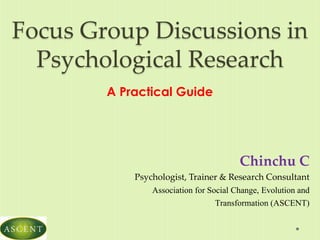
Focus group discussions in psychological research
- 1. Focus Group Discussions in Psychological Research A Practical Guide Chinchu C Psychologist, Trainer & Research Consultant Association for Social Change, Evolution and Transformation (ASCENT)
- 2. Focus Groups • Used in Psychology relatively recently • Popular in Health research, Marketing… • Collects information about people’s opinions, beliefs, attitudes, perceptions, behaviours, motivations etc. • Not done to come to a consensus or make decisions
- 3. Will people speak openly? • Focus Group Discussions do facilitate disclosures and discussions than personal interviews (Amoakohene, 2004) • The key lies in the way the discussion is steered by the moderator/facilitator • Even provocative questions can be asked in a constructive manner • A schedule is needed to act as a backbone
- 4. General Features • Facilitate interaction between members; Direct questions by researcher are kept to a minimum • Ground rules and limits communicated by the facilitator • Focus group is natural & conversational. May include story telling, joking, arguing, boasting, teasing, persuasion, challenge, disagreement… • Quality data is obtained when the focus group is a rewarding experience for the participants • Sessions are recorded and transcribed • Notes and observations taken separately
- 5. • Can be done as one-off event or as multiple sessions with same or different participants • Somewhere between 4 to 8 participants • Types: o Homogeneous V/s Heterogeneous o Pre-existing V/s New o Concerned V/s Naïve • Video clips, films, group tasks etc. can be used to trigger the FGD process General Features
- 6. General Features • Not useful to compare individuals or to measure attitudes • Voluminous, unstructured data; not amenable to summarization or quantification • Analysis should try to preserve the actual words and expressions of participants • Generalization is not the aim, understanding is
- 7. Difficulties • Difficult to recruit participants • Skilled moderators needed • Transcription can consume time • Analysis needs skills and training
- 8. Approaches - Essentialist • Tries to elicit individual participants’ ideas, opinions and understanding of the world • FGD can help in this because it can: o Trigger memories o Stimulate debate o Facilitate disclosure o Encourage elaboration
- 9. Approaches – Social Constructivist • Assumes that ideas are constructed through interactions • Tries to explore this process through FGD • Interested to see how people express, construct, defend and modify their views throughout the discussion • Data analysis techniques differ according to the approach employed
- 10. Designing the FGD • Decide the Research Question • Assess the available time • Number of groups • Where to find participants from? • Location of the FGD • Recording/ Transcription procedure • What other resources are needed/available?
- 11. Ethical Considerations • Informed consent (in writing/recording) • Ethical approval (If a system is available) • Setting the ground rules o No Psychological or Physical harm o Right to Withdraw o Confidentiality and Privacy o Debriefing
- 12. Getting the Participants • Are incentives offered? • Gaining prior informed consent • Beware of dropouts – arrange 50% more participants as stand-by • Issue reminders and directions • Last-day reminders are a must
- 13. Moderator Skills • Interviewing Skills o Rapport building o Prompts and Probes o Sensitivity to Non-verbal cues • Knowledge of Group Dynamics • Experience in working with groups • Motivate shy participants and moderate dominant • Spot signs of discomfort and respond promptly
- 14. While in the FGD • Remember to make notes and observations • Keep a tab on time consumed by each participant • Use Introductory Transition Key sequence for questions/discussion points • Summarize at the end; Let participants clarify doubts or raise questions • Thank the participants and indicate further steps (If any)
- 15. Tips • Maintain a friendly attitude • Do not judge participants verbally or non- verbally • Get clarifications • Keep the discussion focused • Rephrase questions if needed • Look out specially for the Dominant Participants • Prod the Shy participants gently • Diffuse group pressure quickly • Have an answer for the question, “Can we get a copy of the report?”
- 16. The team • Facilitator/Moderator (Researcher) • Note taker • Participant recruiter. • Logistics coordinator. • Translator of transcripts. • Data-analyst.
- 17. Data Analysis • Start immediately; bulk of the unrecorded data fades away quickly • Researcher should try to be present at all stages • Knowledge of CAQDAS is a bonus
- 18. References • Amoakohene, I. M. (2004). Researching radio audiences in an emerging pluralistic media environment: A case study for the focus group discussion (FGD) method. African Media Review,12, 25-40. • Gerritsen, Annette. (2011). Focus Group Discussions – a step-by-step guide (Presentation). University of Limpopo & VLIR project South Africa. • Wilkinson, S. (2008). Focus Groups. In Smith, J. A. (Ed). Qualitative Psychology: A practical guide to research methods. 2e. London: Sage.
